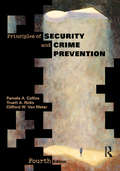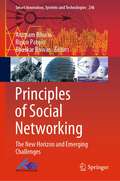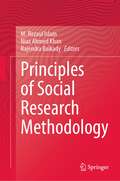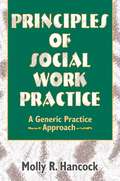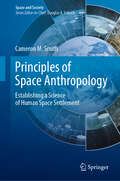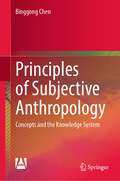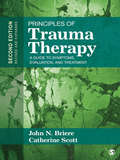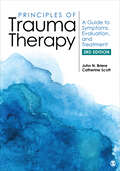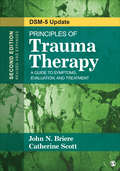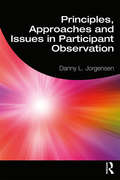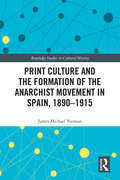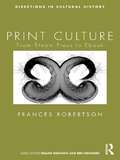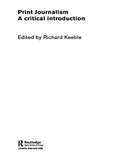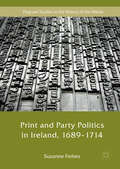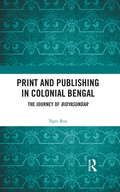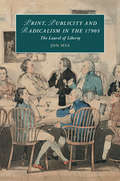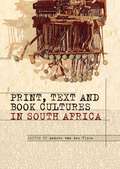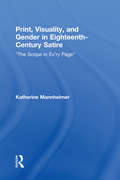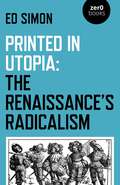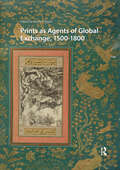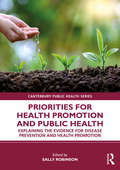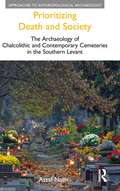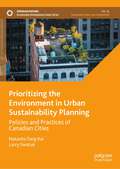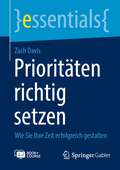- Table View
- List View
Principles of Security and Crime Prevention
by Clifford W. Van Meter Truett A. Ricks Pamela A. CollinsThis introductory text provides a thorough overview of the private security system. This edition includes crime prevention and its zones of protection - the theoretical framework that provides the bridge between private and public sector law enforcement. From the historical development and the professional nature of security and crime prevention to the legal aspects of private security, this well-rounded text covers basic elements of security and crime prevention.
Principles of Social Networking: The New Horizon and Emerging Challenges (Smart Innovation, Systems and Technologies #246)
by Ripon Patgiri Anupam Biswas Bhaskar BiswasThis book presents new and innovative current discoveries in social networking which contribute enough knowledge to the research community. The book includes chapters presenting research advances in social network analysis and issues emerged with diverse social media data. The book also presents applications of the theoretical algorithms and network models to analyze real-world large-scale social networks and the data emanating from them as well as characterize the topology and behavior of these networks. Furthermore, the book covers extremely debated topics, surveys, future trends, issues, and challenges.
Principles of Social Research Methodology
by M. Rezaul Islam Rajendra Baikady Niaz Ahmed KhanThis book is a definitive, comprehensive understanding to social science research methodology. It covers both qualitative and quantitative approaches. The book covers the entire research process, beginning with the conception of the research problem to publication of findings. The text combines theory and practical application to familiarize the reader with the logic of research design, the logic and techniques of data analysis, and the fundamentals and implications of various data collection techniques. Organized in seven sections and easy to read chapters, the text emphasizes the importance of clearly defined research questions and well-constructed practical explanations and illustrations. A key contribution to the methodology literature, the book is an authoritative resource for policymakers, practitioners, graduate and advanced research students, and educators in all social science disciplines.
Principles of Social Work Practice: A Generic Practice Approach
by Molly R HancockPrinciples of Social Work Practice is the first textbook to deal exclusively and thoroughly with the significant principles of social work practice and methods that integrate these principles into the common base of practice. You will learn from case examples how to apply crucial ethical, personal, and methodological principles to different practice areas. As you increase your understanding of the nature of professional social work and the essence of its value base and Code of Ethics, you also learn to develop approaches to social work practice that are sensitive to a multicultural clientele. You will leave this book with useful skills and a flexibility that allow you to work not only with individuals but also with families, couples, groups, organizations, and communities. As you read Principles of Social Work Practice, you will heighten your sensitivity to the professional worker-client relationship and its role as a primary instrument of positive change. Using this book as a guide, you can develop your own strategies for facilitating change and growth that will result in the satisfaction of long-term personal and social goals. Simultaneously, you will build a framework for social work practice that has at its foundation a strong sense of individual worth and dignity. A unique combination of theory and practice, readers gain insight into: confidentiality the nonjudgmental attitude controlled emotional involvement self-determination respect for the individual empowermentPrinciples of Social Work Practice illustrates for advanced undergraduates and graduate students how to effectively intervene in the conflicts that evolve between clients&’ needs for well-being and development and the demands or restrictions of public attitudes or social policy. You will sharpen your skills and construct indispensable methods for helping individuals establish vital links with their communities.
Principles of Space Anthropology: Establishing a Science of Human Space Settlement (Space and Society)
by Cameron M. SmithThis book shows how anthropology can provide an innovative perspective on the human movement into space. It examines adaptation to space on timescales of generations, rather than merely months or years, and uses evolutionary adaptation as a guiding theme. Employing the lessons of evolutionary adaptation, Principles of Extraterrestrial Anthropology recommends evolutionarily-sound strategies of space settlement, covering genetics at the organismal and population levels. The author organizes the concept of cultural adaptation to environments beyond Earth according to observed patterns in human adaptation on Earth. He uses original artwork and tables to help convey complex information in a form accessible to undergraduate and graduate students. Though primarily written to engage students interested in space settlement and exploration, who will eventually build a full anthropology of space settlement, Principles of Extraterrestrial Anthropology is engaging to anthropologists across sub-disciplines, as well as scholars interested in the human dimensions of space exploration and settlement. Just as the term exobiology was invented only a few decades ago to shape the field of space life studies, exoanthropology is outlined to assist in the perpetuation of Earth life through human space settlement.
Principles of Subjective Anthropology: Concepts and the Knowledge System
by Binggong ChenThis book puts forward the concept of “subjective anthropology” and outlines a theoretical system that will allow subjective anthropology to qualify as a new academic discipline in its own right. In an effort to respond to the field’s proper role as the science of humanity, subjective analysis has been introduced into the study of anthropology. The book fills two distinct gaps in our knowledge and understanding of modern man, offering detailed descriptions of personality and of groups, while also advancing the theory of “structure and choice.” The book formulates seven basic principles of subjective anthropology and divides anthropology into three major branches: subjective anthropology, cultural anthropology, and biological (or physical) anthropology, which can be further divided into sub-branches. The book pursues three key goals: advancing and developing the theoretical system of subjective anthropology, reconstructing the discipline of anthropology, and establishing a Chinese anthropology with Chinese characteristics, Chinese visions, and Chinese styles.
Principles of Trauma Therapy: A Guide to Symptoms, Evaluation, and Treatment
by Catherine Scott Dr John N. BriereThis popular text provides a creative synthesis of cognitive-behavioral, relational, affect regulation, mindfulness, and psychopharmacologic approaches to the "real world" treatment of acute and chronic posttraumatic states. Grounded in empirically-supported trauma treatment techniques, and adapted to the complexities of actual clinical practice, it is a hands-on resource for front-line clinicians, those in private practice, and graduate students of public mental health.
Principles of Trauma Therapy: A Guide to Symptoms, Evaluation, and Treatment
by John N. Briere Catherine ScottJohn Briere and Catherine Scott′s Principles of Trauma Therapy, Third Edition is both comprehensive in scope and highly practical in application. This best selling text provides a creative synthesis of cognitive-behavioral, relational, affect regulation, mindfulness, and psychopharmacologic approaches to the "real world" treatment of acute and chronic posttraumatic states. Grounded in empirically-supported trauma treatment techniques and adapted to the complexities of actual clinical practice, this book is a hands-on resource for front-line clinicians, those in private practice, and graduate students of public mental health.
Principles of Trauma Therapy: A Guide to Symptoms, Evaluation, and Treatment
by John N. Briere Catherine ScottJohn Briere and Catherine Scott′s Principles of Trauma Therapy, Third Edition is both comprehensive in scope and highly practical in application. This best selling text provides a creative synthesis of cognitive-behavioral, relational, affect regulation, mindfulness, and psychopharmacologic approaches to the "real world" treatment of acute and chronic posttraumatic states. Grounded in empirically-supported trauma treatment techniques and adapted to the complexities of actual clinical practice, this book is a hands-on resource for front-line clinicians, those in private practice, and graduate students of public mental health.
Principles of Trauma Therapy: A Guide to Symptoms, Evaluation, and Treatment ( DSM-5 Update)
by Catherine Scott Dr John N. BriereThoroughly updated with DSM-5 content throughout, Principles of Trauma Therapy, Second Edition: DSM-5 Update is both comprehensive in scope and highly practical in application. This popular text provides a creative synthesis of cognitive-behavioral, relational, affect regulation, mindfulness, and psychopharmacologic approaches to the "real world" treatment of acute and chronic posttraumatic states. Grounded in empirically-supported trauma treatment techniques and adapted to the complexities of actual clinical practice, this book is a hands-on resource for front-line clinicians, those in private practice, and graduate students of public mental health
Principles, Approaches and Issues in Participant Observation
by Danny L. JorgensenThis book provides a succinct, student-friendly outline of the principles, approaches, and issues in participant observation. An examination of these basic tenets is important for clarifying the philosophical rationale for conducting participant observation, making important research decisions, and appreciating the strengths and weaknesses of different approaches within the method. Participant observation as a formal means of inquiry is developed in close relation with the competing approaches of reality (ontology), truthfully apprehending reality (epistemology), and formal research (methodology). In this volume Jorgensen discusses the resulting methodologies of positivism, humanism, and most recently postmodernism in relation to principles, approaches, and issues in participant observation. Specific features of participant observation, as exemplified in a wide range of classic and contemporary studies, are examined by way of these methodological approaches along with the troublesome complexities of values, politics, ethics, and contemporary debates over appropriate representations of the resulting findings about human life. This concise primer is suitable for undergraduate and graduate students in a wide range of disciplines such as anthropology, religious studies, sociology and nursing.
Print Culture and the Formation of the Anarchist Movement in Spain, 1890-1915 (Routledge Studies in Cultural History #79)
by James Michael YeomanThis book analyzes the formation of a mass anarchist movement in Spain over the turn of the twentieth century. In this period, the movement was transformed from a dislocated collection of groups and individuals into the largest organized body of anarchists in world history: the anarcho-syndicalist National Confederation of Labour (Confederación Nacional del Trabajo: CNT). At the same time, anarchist cultural practices became ingrained in localities across the whole of Spain, laying foundations which maintained the movement’s popular support until the end of the Spanish Civil War in 1939. The book shows that grassroots print culture was central to these developments: driving the development of ideology and strategy – broadly defined as terrorism, education and workplace organization – and providing an informal structure to a movement which shunned recognized leadership and bureaucracy. This study offers a rich analysis of the cultural foundations of Spanish anarchism. This emphasis also challenges claims that the movement was "exceptional" or "peculiar" in its formation, by situating it alongside other decentralized, bottom-up mobilizations across historical and contemporary contexts, from the radical pamphleteering culture of the English Civil War to the use of social media in the Arab Spring.
Print Culture: From Steam Press to Ebook (Directions in Cultural History)
by Frances RobertsonWith the advent of new digital communication technologies, the end of print culture once again appears to be as inevitable to some recent commentators as it did to Marshall McLuhan. And just as print culture has so often been linked with the rise of modern industrial society, so the alleged demise of print under the onslaught of new media is often also correlated with the demise of modernity. This book charts the elements involved in such claims—print, culture, technology, history—through a method that examines the iconography of materials, marks and processes of print, and in this sense acknowledges McLuhan’s notion of the medium as the bearer of meaning. Even in the digital age, many diverse forms of print continue to circulate and gain meaning from their material expression and their history. However, Frances Robertson argues that print culture can only be understood as a constellation of diverse practices and therefore discusses a range of print cultures from 1800 the present ‘post-print’ culture. The book will be of interest to undergraduate and postgraduate students within the areas of cultural history, art and design history, book and print history, media studies, literary studies, and the history of technology.
Print Journalism: A Critical Introduction
by Richard KeeblePrint Journalism provides an up-to-date overview of the skills needed to work within the newspaper and magazine industries. This critical approach to newspaper and magazine practice highlights historical, theoretical, ethical and political debates and includes tips on the everyday skills of newspaper and magazine journalists, as well as tips for online writing and production. Crucial skills highlighted include: sourcing the news interviewing sub editing feature writing and editing reviewing designing pages pitching features In addition separate chapters focus on ethics, reporting courts, covering politics and copyright whilst others look at the history of newspapers and magazines, the structure of the UK print industry (including its financial organization) and the development of journalism education in the UK, helping to place the coverage of skills within a broader, critical context. All contributors are experienced practicing journalists as well as journalism educators from a broad range of UK universities.
Print and Party Politics in Ireland, 1689-1714 (Palgrave Studies in the History of the Media)
by Suzanne ForbesThis book is the first full-length study of the development of Irish political print culture from the Glorious Revolution of 1688-9 to the advent of the Hanoverian succession in 1714. Based on extensive analysis of publications produced in Ireland during the period, including newspapers, sermons and pamphlet literature, this book demonstrates that print played a significant role in contributing to escalating tensions between tory and whig partisans in Ireland during this period. Indeed, by the end of Queen Anne’s reign the public were, for the first time in an Irish context, called upon in printed publications to make judgements about the behaviour of politicians and political parties and express their opinion in this regard at the polls. These new developments laid the groundwork for further expansion of the Irish press over the decades that followed.
Print and Publishing in Colonial Bengal: The Journey of Bidyasundar
by Tapti RoyThis book reconstructs the history of print and publishing in colonial Bengal by tracing the unexpected journey of Bharat Chandra’s Bidyasundar, the first book published by a Bengali entrepreneur. The introduction of printing technology by the British in Bengal expanded the scope of publication and consumption of books significantly. This book looks at the developments and the parallel publishing initiatives of that time. It examines local enterprises in colonial Bengal engaged in producing and selling books and explores the ways in which they charted out a cultural space in the 19th century. The work sheds fresh light on book production and the culture of print, and narrates the processes behind the printing of books to understand the multi-layered literary practices they sustained. A valuable addition to the history of publishing in India, this book will be useful to scholars and researchers of South Asian and Indian history, Bengali literature, media and cultural studies, and print and publishing studies. It will also appeal to those interested in the history of Bengal and the Bengali diaspora.
Print, Publicity, and Popular Radicalism in the 1790s: The Laurel of Liberty (Cambridge Studies in Romanticism)
by Jon MeeJon Mee explores the popular democratic movement that emerged in the London of the 1790s in response to the French Revolution. Central to the movement's achievement was the creation of an idea of 'the people' brought into being through print and publicity. Radical clubs rose and fell in the face of the hostile attentions of government. They were sustained by a faith in the press as a form of 'print magic', but confidence in the liberating potential of the printing press was interwoven with hard-headed deliberations over how best to animate and represent the people. Ideas of disinterested rational debate were thrown into the mix with coruscating satire, rousing songs, and republican toasts. Print personality became a vital interface between readers and print exploited by the cast of radicals returned to history in vivid detail by Print, Publicity, and Popular Radicalism in the 1790s. This title is also available as Open Access.
Print, Text and Book Cultures in South Africa
by Andrew van VliesAn explanation of the unique role of the book and book collecting in South Africa due to the apartheidThis book explores the power of print and the politics of the book in South Africa from a range of disciplinary perspectives- historical, bibliographic, literary-critical, sociological, and cultural studies. The essays collected here, by leading international scholars, address a range of topics as varied as: the role of print cultures in contests over the nature of the colonial public sphere in the nineteenth century; orthography; iimbongi, orature and the canon; book- collecting and libraries; print and transnationalism; Indian Ocean cosmopolitanisms; books in war; how the fates of South African texts, locally and globally, have been affected by their material instantiations; photocomics and other ephemera; censorship, during and after apartheid; books about art and books as art; local academic publishing; and the challenge of 'book history' for literary and cultural criticism in contemporary South Africa.
Print, Visuality, and Gender in Eighteenth-Century Satire: “The Scope in Ev’ry Page” (Routledge Studies in Eighteenth-Century Literature)
by Katherine MannheimerThis study interprets eighteenth-century satire’s famous typographical obsession as a fraught response to the Enlightenment’s "ocularcentric" epistemological paradigms, as well as to a print-cultural moment identified by book-historians as increasingly "visual" — a moment at which widespread attention was being paid, for the first time, to format, layout, and eye-catching advertising strategies. On the one hand, the Augustans were convinced of the ability of their elaborately printed texts to function as a kind of optical machinery rivaling that of the New Science, enhancing readers’ physical but also moral vision. On the other hand, they feared that an overly scrutinizing gaze might undermine the viewer’s natural faculty for candor and sympathy, delight and desire. In readings of Pope, Swift, and Montagu, Mannheimer shows how this distrust of the empirical gaze led to a reconsideration of the ethics, and most specifically the gender politics, of ocularcentrism. Whereas Montagu effected this reconsideration by directly satirizing both the era’s faith in the visual and its attendant publishing strategies, Pope and Swift pursued their critique via print itself: thus whether via facing-page translations, fictional editors, or disingenuous footnotes, these writers sought to ensure that typography never became either a mere tool of (or target for) the objectifying gaze, but rather that it remained a dynamic and interactive medium by which readers could learn both to see and to see themselves seeing.
Printed in Utopia: The Renaissance's Radicalism
by Ed SimonPrinted in Utopia examines the bloody era of the Renaissance in all of its contradictions and moments of utopian possibility. From the dissenting religious anarchists of the 17th century, to the feminist verse of Amelia Lanyer and Richard Barnfield's poetics of gay rights. From an analysis of the rhetoric of feces in Martin Luther, to the spiritual liberation of Anna Trapnell. What is presented is the radical Renaissance too often hidden away, an age which birthed our modern world in all of its ugliness, but which still holds the latent seeds for a new and better future world.
Prints as Agents of Global Exchange: 1500-1800 (Visual and Material Culture, 1300-1700)
by Heather MadarThe significance of the media and communications revolution occasioned by printmaking was profound. Less a part of the standard narrative of printmaking’s significance is recognition of the frequency with which the widespread dissemination of printed works also occurred beyond the borders of Europe and consideration of the impact of this broader movement of printed objects. Within a decade of the invention of the Gutenberg press, European prints began to move globally. Over the course of the fifteenth to the eighteenth centuries, numerous prints produced in Europe traveled to areas as varied as Turkey, India, Iran, Ethiopia, China, Japan and the Americas, where they were taken by missionaries, artists, travelers, merchants and diplomats. This collection of essays explores the global circulation of knowledge, both written and visual, that occurred by means of prints in the Early Modern period.
Priorities for Health Promotion and Public Health: Explaining the Evidence for Disease Prevention and Health Promotion (Canterbury Public Health Series)
by Sally RobinsonPriorities for Health Promotion and Public Health brings together the evidence behind the UK’s public health priorities into one comprehensible textbook. Taking one theme per chapter, the book examines the social and environmental influences that shape people’s health; health inequalities; poverty and health; mental, emotional and spiritual health; sexual health; physical inactivity; diet; tobacco; alcohol; drugs; weight; cardiovascular disease; cancer; diabetes and dementia. The book takes a holistic approach, combining scientific and epidemiological evidence with the subjective experiences of those who undergo these health journeys. Each chapter explains the causes of poor health and the evidence behind the recommendations for good health and ends by demonstrating the health benefits of positive action. This is a core text for those studying health promotion or public health, and a supplementary text for students of healthcare and social care. The book focusses on adults’ health in the UK, with examples from the four nations, and provides some contextual international information where relevant. Priorities for Health Promotion and Public Health is an ideal companion for busy practitioners who work across the wider sectors that support people’s health and wellbeing. It is also an essential textbook for students new to health promotion and public health.
Prioritizing Death and Society: The Archaeology of Chalcolithic and Contemporary Cemeteries in the Southern Levant (Approaches To Anthropological Archaeology Ser.)
by Assaf NativFirst published in 2014. Routledge is an imprint of Taylor & Francis, an informa company.
Prioritizing the Environment in Urban Sustainability Planning: Policies and Practices of Canadian Cities (Sustainable Development Goals Series)
by Larry Swatuk Natasha Tang KaiThis book examines the extent to which the environment is addressed in the sustainability plans of Canadian cities. It assesses if and to what extent select leading environmental priorities are addressed in the sustainability plans of sixteen Canadian cities, followed by analysis of efforts towards each priority. It scores and ranks cities against each environmental priority and highlights what makes some cities lead and others lag in environmental sustainability.The book unravels the complexity, similarities, and differences in environmental sustainability planning across major cities in Canada. The project reflects what’s working, who’s leading, and which environmental priorities support the sustainable city model. Climate change has exacerbated the impacts of flood, droughts, wildfire and storms, urban centers must account for sustainability to mitigate and adapt to a changing and uncertain landscape. It begins with robust and integrative sustainability plans that prioritize the environment. This book will make a timely contribution to the on-going debate regarding the ways and means to become a sustainable city. It reflects the on-going sustainable development discourse and deliberations to meet the Sustainable Development Goals. It cut across many SDGs in particular SDG 11, Sustainable Cities and Communities. What makes this study unique is its special attention to environmental priorities within urban sustainability planning. This subject is topical and would appeal to both scholars and practitioners at local, regional, national, and global scales.
Prioritäten richtig setzen: Wie Sie Ihre Zeit erfolgreich gestalten (essentials)
by Zach DavisWenn Sie (zu) viel zu tun und zu wenig Zeit haben, Ihr Alltag von Unterbrechungen, Unvorhersehbarem und hohen Anforderungen gekennzeichnet ist, werden Sie hier fündig. Sie erfahren, wie Sie die Fremdsteuerung in den Griff bekommen und durch ein verbessertes Selbst- und Zeitmanagement Ihre Produktivität steigern und den Stresspegel senken.Dieses Werk zeichnet sich durch seine Praxistauglichkeit aus – es ist von einem Praktiker für Praktiker entwickelt. Sie erhalten die Skills, die Sie für eine zunehmend herausfordernde Welt benötigen.Den kostenlosen Zugang zum Online-Kurs finden Sie direkt im Buch.
